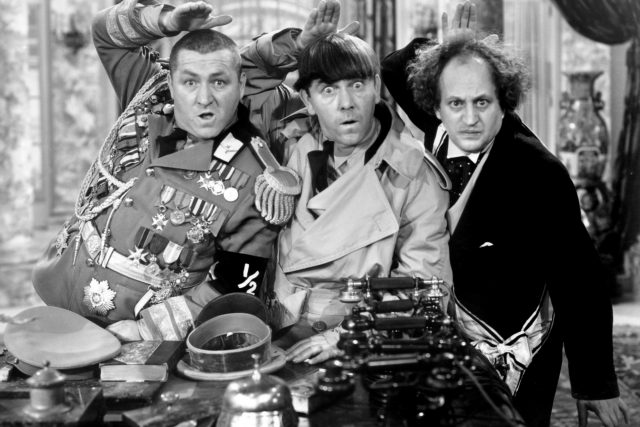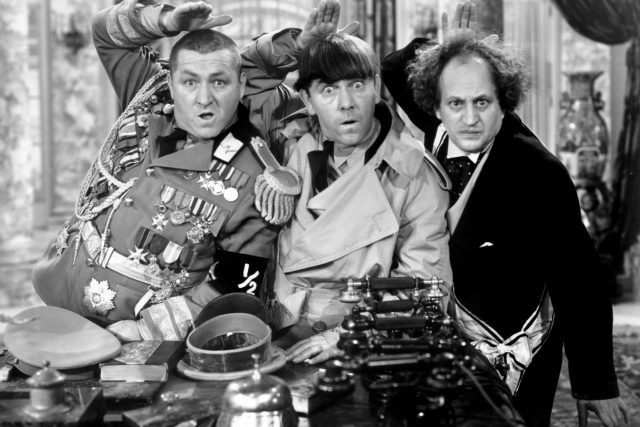You Don’t Like Comedy Classics? You’re Kidding, Right? One Writer Questions History’s Love of the Three Stooges



Lucas Wesley Snipes is a comedian and contributing writer for The Interrobang.
It’s New Year’s Eve, 2006. I’m 17 and considering a career in comedy, or at least an occasional gig writing about it, and I’m at a stand-up show with a handful of friends. Two middle-aged comics who’s names I could never remember are performing Abbott & Costello’s so-called classic routine, “Who’s On First,” and the crowd is so dead we may not make it to 2007. As a wannabe comic, I took this as a vindicating moment where I learned I wasn’t alone in having never found that tired, outdated routine worth so much as a chuckle. Nearly a decade later, I look back on the incident and realize how strange it was so many people collectively and openly rejected comedy history, even if I still think “Who’s On First?” isn’t funny on a personal level.
While part of me is surely telling this story as a premature defense that proves I’m not entirely alone in what this article will argue, the auspice on which I bring it up is that I’ve long been able to recognize how much of an anomaly the experience was, in that Abbott & Costello are still highly lauded as comedy legends, two of the men who helped define the genre as it is today. Like any connoisseur of the comedic arts, I’ve done my best to experience as many of the classics as I can, and like any nerd, this includes spending hours reading about them online after the fact to make sure I’ve properly framed what I witnessed in history, and understand it for what it was. Because of this, I understand that Abbott & Costello changed things, but the truth is, I can’t for the life of me figure out how, considering how plainly unfunny I feel their most celebrated routines have always been, regardless of when you heard them.
Most forms of entertainment love to celebrate the roots of the art form, but unfortunately, it feels to me like the roots of comedy are often downright embarrassing. All art needs to be examined within the proper time frame in order to understand its role in history, and yet with comedy, it can be almost impossible to do this thanks to the medium’s need for feeling fresh, new, and exciting. The beginning of photography or film might be fascinating to see how society started learning to use technology, while the beginning of comedy, on the other hand, probably wasn’t all that different from what comedy is today. Someone told a joke and someone else laughed. Maybe there wasn’t even a joke, something just happened that made everyone laugh. Comedy has never been reliant on technology, and therefore the genre could have been pretty universal from the very start. It obviously wasn’t though, and to figure out why, one needs to take a deeper look at what some of the earlier comedy classics were.
Mainstream comedy started to spread through vaudeville, with the most popular vaudeville or vaudeville-based acts ultimately finding their way towards the silver screen. Two of the biggest luminaries of this era were the aforementioned Abbott & Costello and the equally unfunny bare bones nyuck-nyucks of The Three Stooges. The two acts were wildly different, although this difference only serves to help explain why the modern comedy fan would have difficulty enjoying the so-called classic content these legends created. Abbott & Costello at least had wordplay and characterization that could make them somewhat palatable in 2016, whereas The Stooges, to quote Jerry Seinfeld, were “three kinda funny looking guys and they hit each other a lot.” And that was pretty much it.
The problem isn’t that hitting someone for a laugh can’t be funny, because it can be outright hilarious in the proper context. The problem is that hitting someone isn’t funny in and of itself; the characters need to arrive at the moment of violence in a deserved and meaningful way, otherwise, it isn’t funny, it’s mean. The Stooges existed at a time where no one had ever hit someone else for a laugh on camera before, and this meant they didn’t need to worry about any of that. Slapping and nose pulling was funny so long as the audience knew it was happening to a wise guy, or at least that could be the case for an extremely entertainment starved audience viewing something made by outrageously lazy writers.
Since the Stooges made their debut in the 1920s, the idea of violence as comedy has expanded to such a degree that merely pulling someone’s nose and saying nyuck-nyuck-nyuck has gone from a punch line to a meaningless way of showing one’s frustration. For a more recent example, look to a groundbreaking show like It’s Always Sunny in Philadelphia, which once proudly created an episode where Frank Reynolds set his daughter Sweet Dee on fire multiple times, all the while repeatedly promising her no one would get hurt by his scheming. The pain has seriously escalated from a few slaps on the face, but instead of appearing cruel, the situation is so over-the-top and bizarre it wraps around to being funny not because Dee got hurt, but because of the stupidity involved leading to Dee getting hurt. Plus, she didn’t just “get hurt,” she gets engulfed in flames multiple times in a single episode. That’s heightening, something The Stooges never even considered.
Maybe it isn’t fair to compare Larry, Moe, and Curly to Sweet Dee and the Gang, but the Stooges feeling dated is hardly something that happened in recent times. Always Sunny makes them feel downright irrelevant, as do movies like Kick-Ass or Kingsman, where the violence is the punch line; however, the Stooges have felt outdated since Lucy tricked Charlie Brown into kicking a football she knew he’d never make contact with. Even Peanuts had more characterization than the Stooges, so readers cared when Charlie fell down and said “Good Grief” and Lucy made fun of him for it. Quite frankly, I’ve never understood why we cared when a Stooge said nyuck-nyuck-nyuck after doing the same gag for the umpteenth time.
The Abbot & Costello example is more concerning to break down, because wordplay has long been one of comedy’s most simple concepts, and it still is. The unfortunate reality of a routine like “Who’s On First?” is that modern audiences probably ignore the real gag, which wasn’t that baseball players have silly names, but rather that lots of foreigners were playing baseball, and foreigners have silly names (imagine if it were called Hu’s on First). Vaudeville was already doing gags about confusing words, and comedians Bert Wheeler and Robert Woolsey already popularized a non-racist routine about town names (where the town of What was next to Which, and Neither was far from There) over a decade before Abbott & Costello’s more famous baseball player version. Abbott & Costello slyly introduced racism to the bit and turned it into the most endearing routine of its day.
As if the racism weren’t damning enough, the fact of the matter is a routine like “Who’s On First?” is patently one note, and takes forever to drive that note home. It probably isn’t fair to compare 1930s humor to Arrested Development, and yet nothing so succinctly sums up the irrelevance of “Who’s On First?” like the mouthful that is “Bob Loblaw’s Law Blog.” In less than a second, the Arrested writers created a better, less offensive joke on the same painstaking concept as “Who’s On First?,” and it wasn’t even the first or more blatant time people had tried. The Kids in the Hall famously ran a series of sketches lambasting the routine, culminating with Dave Foley’s naïve foreigner going “Ooooh, I see what you’ve done” seconds into Kevin McDonald’s attempt at reviving the bit for a modern audience. Amazingly, it was more than 10 years after The Kids were canceled, I witnessed comics attempting to do it for real, albeit this time, neither of them got the fact that they were the joke, and the audience, therefore had nothing to laugh about, either.
So, what is the solution? Ignore classics like Abbott & Costello, and cast them off as racist, while simply forgetting about The Three Stooges in light of how powerfully they’ve been eclipsed by people who were actually trying? That probably isn’t going to happen, but the thing is, there would be absolutely no harm in doing so. Classics only deserve their historical status if we still have something to learn from them. All we have to learn from Abbott & Costello or The Three Stooges is that people in the past didn’t care who they offended, or about the fact their comedy had no purpose. Who wants to remember that?
Not Hu, that’s for sure.
Read more comedy news, stories, interviews with comedians, videos and comedy clips on our home page. Get more comedy news. Watch more viral videos. Read more interviews with the best comics in the business.
.
Latest posts by Lucas Wesley Snipes (see all)
- You Don’t Like Comedy Classics? You’re Kidding, Right? One Writer Questions History’s Love of the Three Stooges - November 3, 2016
- You Are On The Air: A Timeline of the How Comedy Entered the Race For President - September 25, 2016
- Why TV Needs a Tough Crowd - September 7, 2016
